
The Federal Building and United States Courthouse, built in 1930, is a historic landmark located at 421 Gold Avenue SW in downtown Albuquerque, New Mexico. It is part of the complex of federal buildings on Gold Avenue that includes the Old Post Office, Dennis Chavez Federal Building, and the Federal Building at 517 Gold SW.

The Frank M. Johnson Jr. Federal Building and United States Courthouse is a United States federal building in Montgomery, Alabama, completed in 1933 and primarily used as a courthouse of the United States District Court for the Middle District of Alabama. The building is also known as United States Post Office and Courthouse—Montgomery and listed under that name on the National Register of Historic Places. In 1992, it was renamed by the United States Congress in honor of Frank Minis Johnson, who had served as both a district court judge and a court of appeals judge. It was designated a National Historic Landmark in 2015.

The Humboldt County Courthouse is located in Dakota City, Iowa, United States, and dates from 1939. It was listed on the National Register of Historic Places in 2003 as a part of the PWA-Era County Courthouses of IA Multiple Properties Submission. The courthouse is the second building the county has used for court functions and county administration.
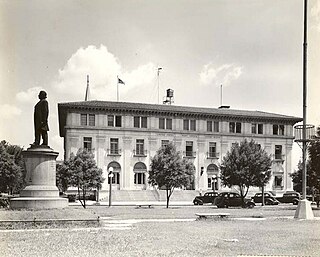
The United States Post Office and Courthouse in Augusta, Georgia is a U-shaped building that was built during 1915-16 as a post office and courthouse, with elements of Italian Renaissance Revival architecture including creamy marble walls and a red mission tile roof. Design credit is to U.S. Supervising Architect Oscar Wenderoth. The building was extended to the rear in 1936, and received interior modernizations in 1960 and 1971. It was vacated and extensively rehabilitated during 1992-96.

The U.S. Post Office and Courthouse-Littleton Main, now serving exclusively as the Littleton Main Post Office, is a historic federal building at 134 Main Street in Littleton, New Hampshire. Built in 1933, it is one of the more architecturally sophisticated and imposing federal buildings built in New Hampshire in the 20th century. The building was listed on the National Register of Historic Places in 1986.

The U.S. Post Office and Courthouse in Bismarck, North Dakota, United States, was built during 1912-13 and expanded in 1937. It was designed by James Knox Taylor and includes Late 19th and 20th Century Revivals architecture and Second Renaissance Revival architecture. Also known as Federal Building, it served historically as a courthouse and as a post office. The building was listed on the National Register of Historic Places in 1976.
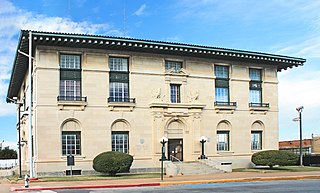
The Paul Brown Federal Building and United States Courthouse, also known as Sherman U.S. Federal Building, is a historic government building in Sherman, Texas. It was built during 1906-1907 and reflects Renaissance Revival architecture. The building was listed on the National Register of Historic Places in 2000 as the US Post Office and Courthouse. It served historically as a post office and continues to serve as a federal courthouse for the United States District Court for the Eastern District of Texas. In 2014, the building was renamed in honor of District Judge Paul Neeley Brown.
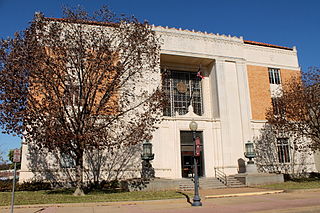
The William M. Steger Federal Building and United States Courthouse is a historic government building built in Tyler, Texas. It was built during 1933-1934 in a restrained Classical Revival style. It served historically as a courthouse, post office, and a government office building. The building was listed on the National Register of Historic Places in 2001 as the Tyler US Post Office and Courthouse.

The Des Moines County Court House located in Burlington, Iowa, United States, was built in 1940. It was listed on the National Register of Historic Places in 2003 as a part of the PWA-Era County Courthouses of Iowa Multiple Properties Submission. The courthouse is the fourth structure to house court functions and county administration.

The Warren County Courthouse in Indianola, Iowa, United States, was built in 1939. It was listed on the National Register of Historic Places in 2003 as a part of the PWA-Era County Courthouses of IA Multiple Properties Submission. The courthouse is the third building the county has used for court functions and county administration.

The Keokuk County Courthouse located in Sigourney, Iowa, United States, was built in 1911. It was individually listed on the National Register of Historic Places in 1981 as a part of the County Courthouses in Iowa Thematic Resource. In 1999 it was included as a contributing property in the Public Square Historic District. The courthouse is the fourth building the county has used for court functions and county administration.

The Polk County Courthouse located in Des Moines, Iowa, United States, was built in 1906. It was listed on the National Register of Historic Places in 1979 as a part of the County Courthouses in Iowa Thematic Resource. The courthouse is the third building the county has used for court functions and county administration.

The Louisa County Courthouse in Wapello, Iowa, United States, was built in 1928. It was listed on the National Register of Historic Places in 1981 as a part of the County Courthouses in Iowa Thematic Resource. The courthouse is the fourth building the county has used for court functions and county administration.
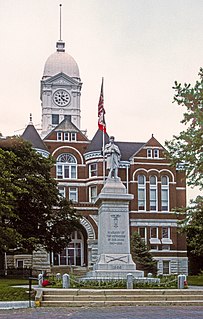
The Taylor County Courthouse in Bedford, Iowa, United States, was built in 1892. It was listed on the National Register of Historic Places in 1981 as a part of the County Courthouses in Iowa Thematic Resource. The courthouse was the second building the county has used for court functions and county administration.
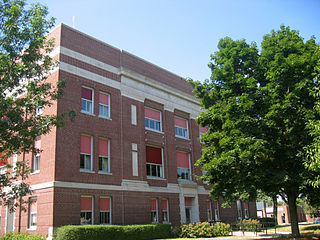
The Ringgold County Courthouse in Mount Ayr, Iowa, United States, was built in 1927. It was listed on the National Register of Historic Places in 1981 as a part of the County Courthouses in Iowa Thematic Resource. The courthouse is the fourth building the county has used for court functions and county administration.

The Decatur County Courthouse, located in Leon, Iowa, United States, was built in 1908. It was listed on the National Register of Historic Places in 1981 as a part of the County Courthouses in Iowa Thematic Resource. The courthouse is the sixth building the county has used for court functions and county administration.

The Harrison County Courthouse, located in Logan, Iowa, United States, was built in 1911. It was listed on the National Register of Historic Places in 1981 as a part of the County Courthouses in Iowa Thematic Resource. The courthouse is the fifth building the county has used for court functions and county administration.

The Monona County Courthouse, located in Onawa, Iowa, United States, was built in 1892. It was listed on the National Register of Historic Places in 1981 as a part of the County Courthouses in Iowa Thematic Resource. The courthouse is the third building the county has used for court functions and county administration.

The Townsend Hotel, also known as the Hotel Townsend, is a historic hotel in Casper, Wyoming. It was renovated and expanded for government use in 2008-2009 and is now known as the Townsend Justice Center.

The United States Post Office, also known as the Federal Building, is a historic post office building located at Greenville, Pitt County, North Carolina. It was designed by the Office of the Supervising Architect under the direction of Oscar Wenderoth and built in 1913–1914. It is a two-story, five bay, Florintine Renaissance style stuccoed brick building on a limestone base. It has a low hip roof of terra cotta tile with overhanging eaves. The front facade features a three-bay loggia formed by arches with voluted keystones, springing from Tuscan order columns. This building served as the main post office for Greenville until 1969. It currently serves as a U.S. Courthouse.

























